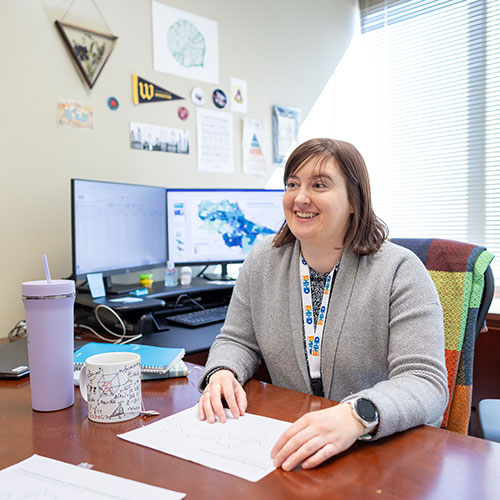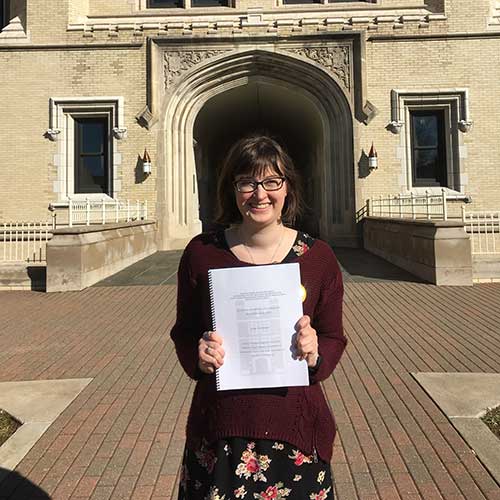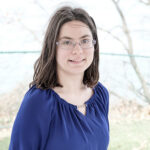
Self-designed major Jennifer Shepheard ’18 finds her niche in public health

A seventh-grade project to identify a disease and how it was spreading in the population sparked an interest in epidemiology and public health for Jennifer Shepheard ’18 before she knew what epidemiology was.
“Even as a seventh grader, I was intrigued with the complexity of the assignment, but at the time I didn’t know it was called ‘epidemiology,’” recalled The College of Wooster alumna and senior population health epidemiologist for the Richmond and Henrico Health Districts in Virginia. By the time she arrived at Wooster in 2014, Shepheard knew the First-Year Seminar: Pandemics in a Global Society course was the right choice to fuel her interest in public health and the spread of diseases.
Shepheard realized by the time she was a sophomore that she wanted to take advantage of Wooster’s program to develop a student-designed major. With the guidance of Stephanie Strand, associate professor of biology who was her advisor from orientation through graduation, and Drew Pasteur, professor of mathematics who also advised her from when she declared her major through graduation, Shepheard chose public health: epidemiology. She combined courses that she thoroughly enjoyed—biology, math, social sciences, and sociology—to design her major with her advisors.
Throughout her college experience, Shepheard took advantage of opportunities to learn skills important to working in public health. After her sophomore year, she studied demographic health surveillance data, set up small, low-cost pharmacies, and led workshops about nutrition and the prevention of infectious diseases as a global justice volunteer for three months in Nicaragua. She continued international work in South Africa and Zambia for a few months after she graduated. As a member of the APEX assessment team for nearly three years, Shepheard learned how to design and develop surveys. Guided by staff in the Center for Advising, Planning, and Experiential Learning, the assessment team was tasked with conducting evaluation surveys about the use of APEX and students’ summer activities and analyzing data for one-year and five-year post-graduation surveys. “I regularly use the skills of building, designing, and analyzing surveys today,” Shepheard said.
Her Independent Study, “The Shot Heard Around the World: Determining the Influence and the Spread of the Anti-Vaccination Ideology on Measles Outbreaks Using Epidemiological Models,” provided a catalyst to research disease spread. Intrigued by measles outbreaks in Disneyland and Ohio that made headlines in 2014, Shepheard examined how anti-vaccination ideology and people’s different belief systems may have contributed to the outbreaks.

After tuning in her I.S. senior year, Shepheard celebrated per Wooster tradition with a Tootsie Roll and collecting the No. 10 button for turning in her project.
She used mathematical models “to examine if vaccine hesitancy, leading to individuals not being vaccinated, interplayed with the spread of measles,” she said. Shepheard also looked at how ideology, in addition to the disease, may spread within a population. Little did she know that the research she did for her I.S. was precursory training for the coronavirus pandemic.
After graduating from Wooster in 2018, Shepheard first worked as a health educator for the Washington County Health Department in Maryland, focused on sexually transmitted infections and HIV prevention. “I had all this interesting data on STIs and HIV, so I would run data analyses to not only look at program evaluation but also how I could better determine at-risk individuals,” she said. In addition to her work as a health educator, the analysis fascinated her and proved valuable when the pandemic began in March 2020.
Shepheard was furloughed for less than one week from her position with the health department and brought back the next week. “They needed someone who knew how to create a database for all the COVID cases,” she said. “How I was able to work and help in the pandemic was due to my education at Wooster.”
Everyone was overwhelmed in the beginning of the pandemic, and there was little guidance about what questions to ask for contact tracing. When the department needed someone to step up their process, Shepheard was ready. The critical thinking skills and modeling techniques she learned at Wooster through classes, experiential opportunities and her I.S. helped her think through the questions to ask and then start to see the patterns of COVID-19 cases. By the end of the pandemic, she was overseeing the entire contact tracing team and managing all the community, school, and business outbreaks.
“I was always quite shocked when my supervisors kept asking me to do more,” despite not having a master’s degree at the time, Shepheard said. “They continued to affirm that I was on the right path and to keep going,” she said. Prior to accepting her current position at the Richmond and Henrico Health Districts, Shepheard earned a master’s degree in demography and health from the London School of Hygiene and Tropical Medicine. Her interest in how diseases spread on the population level led to the focus in demography rather than the more traditional master’s in epidemiology.
She plans to pursue a doctoral degree in social epidemiology next, delving more into the societal characteristics that affect risk factors, patterns of disease, and health distribution. Shepheard is more interested in studying the determinants of health, such as poverty, health behaviors, racism, and other structural factors that can impact someone’s health. “A lot of the work I’ve done has been a connecting factor, not looking at just the disease or health outcome, but more of the social and societal factors that are influencing the spread of diseases,” she said. “I enjoy the complexity of epidemiology and believe that looking at data in relation to human experience can reveal many patterns necessary to create sustainable solutions in order to solve the most challenging problems.”
Photos courtesy of Jennifer Shepheard.
This feature originally appeared in the Summer 2024 issue of Wooster magazine.
Posted in Alumni, Magazine on May 17, 2024.
Related Posts
Related Areas of Study
Public Health
Explore the many options and paths for those who want to be part of the world of health care
PathwayMathematics
Numbers + patterns + structures multiplied by a zest for analysis and inquiry
Major MinorBiology
Explore molecular and cellular biology, ecology and more with top faculty and access to extensive lab facilities.
Major Minor

